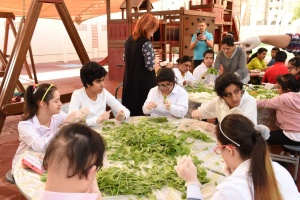 Senior School
Senior School
We currently have six classes in the senior school with Arabic and English streams, ISL classes and an ILG class.
Senior Tier
Our aim is to develop our students’ skills to enable them to be as independent as possible in their daily lives and that will prepare them for employment in the community and/or progress to our workshop provision. [where appropriate]
The curriculum is activity based. At its core, is the belief that students learn best by doing, and remember most by engaging in activities that relate to the content to be learned. The students will be engaged in hands-on practical tasks through which they will develop specific skills to enable them to develop their independence and hopefully for some, gain employment.
The curriculum offers a broad range of learning experiences that we have identified as meaningful and useful to our students.
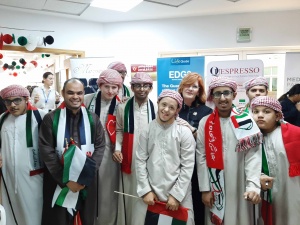 Content
Content
The following subjects will be delivered:
Functional Skills [Literacy/numeracy, communication], ICT and practical tasks will be incorporated into the program.
ASDAN Towards Independence Modules: Practical Workshop (incorporating our Specialisms Program)The focus is to introduce students to tasks carried out in our workshops provision. Students will also learn to work safely and make an item following a plan. Each module will be organized as a carousel with students participating in a short series of lessons on one ‘specialism’.
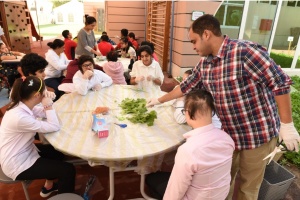 Classes will choose a minimum of three modules from the following:
Classes will choose a minimum of three modules from the following:
Meal Preparation and Cooking: Introduction
Meal Preparation and Cooking: Sensory
Using Transport
Printing
Money: Introduction
Myself and Others
Personal Care Routines: Sensory
Program accessed by selected students or individually
Transition Planning
All Senior Centre Students will go through our transition planning process to help them and their families prepare for life after attending the Centre. Their strengths, interests, needs and aspirations will be identified through individual and small group tasks and interviews with their families. A Transition Plan setting out how they will achieve their goals will then be formulated. This will be reviewed annually.
Work Experience (for students aged 16 and above, where appropriate):
This program has two aims:
To give the students opportunities to experience real work environments, enabling them to make informed decisions about their work-related preferences.
To develop the students’ work-related skills and independence We currently offer work experience in 3 key areas, Hospitality, Retail and Office work.
Parents of students involved in the program will be required to sign consent forms before a student can commence this program.
Additional Timetabled Subjects Across The Tiers
Arts Department Program:
This includes, Music, PE, Motion Drama and Arts and will be delivered by our specialist staff.
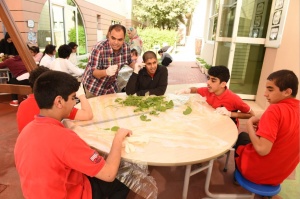 Swimming
Swimming
For those classes that have an allocated swimming session, all students are required to participate unless there is a medical reason. Parents will be required to provide a medical letter if they do not wish their child to swim. Suitable swimming clothing must be provided, including a swimming hat. Students may wear goggles.
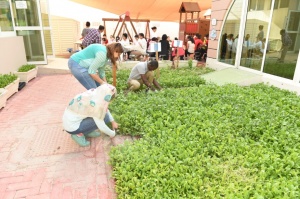 PE
PE
Please provide a suitable PE outfit for your child.
Smart Room
A timetable is set for all classes to use this dedicated room to enable students to develop their ICT skills or experience the effect of using assistive technology
Islamic Studies
This program is delivered to most students.
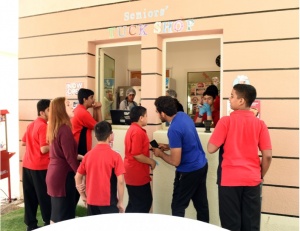 Quran Studies
Quran Studies
This program is available to Arabic Students
Cultural Awareness
All classes have the opportunity to use the cultural heritage room. Where students lean more about the UAE’s history, culture, religion and celebrations
Languages
For Senior students in either of the English or Arabic stream, basic communication in a 2 nd language has been introduced. For Arabic students, they will have the opportunity to learn basic English and for the English stream the opportunity to learn basic Arabic.
The Rashid Pre -Vocational Program
This program has been designed to promote the development of skills valued by employers and that help our students gain meaningful employment.
This includes: solving problems and working with others
Moral, Social and Cultural Values
The Development of Student Values
In our Centre we are committed to providing appropriate opportunities for the development of students’ moral, social and cultural values through both the ethos and the curriculum. This will be undertaken and will take account of the individual needs of students and the views of parents.
Our Centre welcomes and encourages diversity and individuality, while emphasising our common commitment to moral values such as honesty, respect for others, compassion and tolerance. It is a fundamental principle of The Rashid Centre that all who are involved in the life of our Centre have the right to be respected as individuals and carry the responsibility to act in a considerate and respectful manner towards others.
Moral Education
During assemblies, we encourage awareness of matters of a cultural, social and moral nature.
We aim to develop in our students an ethos of tolerance, understanding and respect for the beliefs and customs of others. The Centre is committed to supporting the development of its students as whole people and as a result, wish to encourage their development in moral, social and cultural terms.
The key human aspects of learning are supported by:
- Creating an atmosphere that is both caring and challenging and which provides opportunities for the development of personal responsibility.
- Promoting social and moral learning through the way in which disciplinary issues are handled.
- Ensuring staff and adults within the Centre provide positive models for students.
- Arranging regular gatherings of the Centre community and using such
occasions to encourage and reinforce the UAE values on which the Centre is based. - Enriching the curriculum in all appropriate areas with an emphasis on moral, social and cultural development.
- Providing opportunities within the curriculum to advance personal and social development.
- Taking every opportunity to acknowledge value and appreciate the culture and heritage of the UAE and to encourage students to appreciate and value the cultures and heritage of others
Various topics are covered to promote Social and Moral Education:-
Early Years and lower Intermediate
- Friendships and relationships
- Carers and people who look after us
- Respect and appropriate behaviour
- Keeping safe
- Similarities and differences
Upper Intermediate and Seniors
- Wide ranging friends and relationships
- Health and wellbeing of others
- Changing relationships
- Respect and appropriate behaviour
- Emotional issues
- Puberty and personal hygiene [where appropriate]
- Keeping safe
These areas are not taught in isolation, but are included across many areas of the curriculum. In addition to the learning areas, the following topics may be discussed at age appropriate stage:
Taking Responsibility
We encourage students and Trainees to take responsibility within the Centre. This allows them to have a say in aspects of what happens in Centre and allows them to see that they can make a positive difference. We plan to achieve this by:
The formation of The Future Leaders Council –members will make decisions about activities, trips and improvements that the centre could consider.
Student Involvement Groups – currently Gardening, Sailing, running a tuck shop, new technology, and the Rashid Stars
We aim:
To develop our students’ skills to enable them to be as independent as possible in their daily lives.
To develop the skills that will prepare our learners for training or employment in the community and/or within our workshop provision.
The curriculum is activity based. At its core, is the belief that students learn best by doing, and remember most by engaging in activities that relate to the content to be learned. The students will be engaged in hands-on practical tasks through which they will develop specific skills to enable them to develop their independence and gain employment.
The curriculum offers a broad range of learning experiences that we have identified as meaningful and useful to our learners.
It covers one school year but can be extended to two or more years by teaching a unit in more detail and depth.

